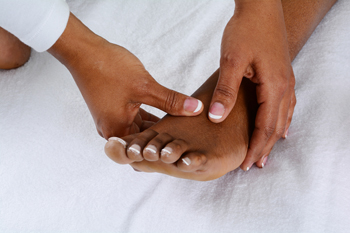
 Tarsal tunnel syndrome is a condition caused by the compression of the tibial nerve in your ankle. The tibial nerve can become compressed as the result of trauma, such as a fall, or from overuse. Tarsal tunnel syndrome might also arise as a complication following an ankle sprain or other lower limb injury, or following surgery. People who are diagnosed with diabetes or rheumatoid arthritis are at an increased risk of developing tarsal tunnel syndrome. The typical symptoms of this condition are a tingling, pins and needles sensation along the inner side of the ankle or foot, pain during extended periods of walking or standing, a burning sensation in the foot at night, and weakness in the muscles that bend the toes. If you are experiencing any symptoms of tarsal tunnel syndrome, it is suggested that you consult with a podiatrist.
Tarsal tunnel syndrome is a condition caused by the compression of the tibial nerve in your ankle. The tibial nerve can become compressed as the result of trauma, such as a fall, or from overuse. Tarsal tunnel syndrome might also arise as a complication following an ankle sprain or other lower limb injury, or following surgery. People who are diagnosed with diabetes or rheumatoid arthritis are at an increased risk of developing tarsal tunnel syndrome. The typical symptoms of this condition are a tingling, pins and needles sensation along the inner side of the ankle or foot, pain during extended periods of walking or standing, a burning sensation in the foot at night, and weakness in the muscles that bend the toes. If you are experiencing any symptoms of tarsal tunnel syndrome, it is suggested that you consult with a podiatrist.
Tarsal tunnel syndrome can be very uncomfortable to live with. If you are experiencing tarsal tunnel syndrome, contact Dr. Todd Goldberg of Complete Family Foot Care Center. Our doctor can provide the care you need to keep you pain-free and on your feet.
Tarsal Tunnel Syndrome
Tarsal tunnel syndrome, which can also be called tibial nerve dysfunction, is an uncommon condition of misfiring peripheral nerves in the foot. The tibial nerve is the peripheral nerve in the leg responsible for sensation and movement of the foot and calf muscles. In tarsal tunnel syndrome, the tibial nerve is damaged, causing problems with movement and feeling in the foot of the affected leg.
Common Cause of Tarsal Tunnel Syndrome
The Effects of Tarsal Tunnel Syndrome
A physical exam of the leg can help identify the presence of tarsal tunnel syndrome. Medical tests, such as a nerve biopsy, are also used to diagnose the condition. Patients may receive physical therapy and prescriptive medication. In extreme cases, some may require surgery.
If you have any questions please feel free to contact our office located in Littlestown, PA . We offer the newest diagnostic and treatment technologies for all your foot and ankle needs.